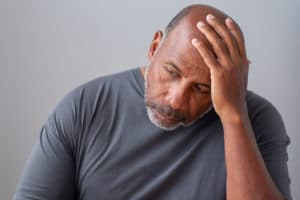 As men, we tend to believe that masculinity embodies and exhibits specific traits, characteristics, and values. These include autonomy, independence, achievement, courage, strength (which sometimes manifests as a desire to avoid the appearance of weakness), success, power, competition, emotional stoicism (which sometimes manifests as discomfort experiencing and communicating tender feelings), risk-taking, adventurousness, and aggression. Many of us may be operating under the assumption that going to counseling or undergoing therapy would require us to adopt attitudes or exhibit behaviors that are antithetical to our masculinity. Men often have a difficult relationship with mental illness.
As men, we tend to believe that masculinity embodies and exhibits specific traits, characteristics, and values. These include autonomy, independence, achievement, courage, strength (which sometimes manifests as a desire to avoid the appearance of weakness), success, power, competition, emotional stoicism (which sometimes manifests as discomfort experiencing and communicating tender feelings), risk-taking, adventurousness, and aggression. Many of us may be operating under the assumption that going to counseling or undergoing therapy would require us to adopt attitudes or exhibit behaviors that are antithetical to our masculinity. Men often have a difficult relationship with mental illness.
This is an understandable assumption, yet one that, I believe you will be relieved to discover, is largely erroneous. It is also an unfortunate assumption, given the prevalence of serious mental and behavioral health problems among men.
Men and Mental Illness: the risks
Men are at heightened risk for a number of physiological, psychological, and behavioral health problems compared to women. These include heart disease, cancer, HIV infection, tobacco use, substance abuse, the commission of a violent crime, and suicide. While reported rates of depression, for example, are 50 percent lower among men compared to women, men’s rate of suicide is four times that of women’s. This is a demographic trend that has held steady since at least 1950. Researchers believe that many men manifest depression indirectly through signs and symptoms such as irritability, interpersonal distancing, compulsivity, somatization, and problems with motivation and concentration.
Despite the prevalence of certain mental and behavioral health problems among men, we are less likely than women to seek either physical or mental health services. As a group, men do not go to counseling or therapy as often as women during any given year or over the course of their lifetimes. This holds true across diverse groups of men. Men of color, for instance, are among the least likely to go to counseling or therapy. (NCBI)
If you are a man and you are in psychological or emotional distress—or perhaps you are dissatisfied in some indescribable or unnameable way— you’re in good company. Lots of other men are, too. Men can suffer from mental illness. It is absolutely okay not to be okay.
Masculine traits can support therapy
Some of the masculine traits, characteristics, and values I have listed are admittedly an awkward fit for the counseling situation. However, others are well suited to position men to derive palpable benefits from therapy. In so many ways, the virtues of masculinity—expressed in a balanced, moderate way—are exactly what is needed to meet the kinds of challenges that emerge in counseling or therapy.
Consider strength and courage. I can hardly think of two virtues more necessary in the course of counseling or therapy. Strength and courage are required to confront oneself, speak ugly truths, face difficult feelings, express sensitive emotions, tolerate ambiguity and uncertainty, and summon the willingness to do these things time and time again, week after week.
Consider risk-taking and adventurousness. In order to get the most out of counseling or therapy, it can be helpful to approach it with a bold, adventurous spirit that enables emotional and interpersonal risk-taking.
Reasons for avoiding therapy
 Some men may avoid counseling or therapy because they expect they are going to be misunderstood, devalued, or disrespected as men in therapy. Men often receive the message that traditional masculine ideology is something that hurts ourselves and others. It’s no surprise that some of us expect to be devalued in therapy. Our concerns about preserving our masculinity may occasionally prevent us from seeking the help we need. But as soon as we enter the counselor or therapist’s office, many of the virtues of traditional masculinity become our greatest allies on the journey inward.
Some men may avoid counseling or therapy because they expect they are going to be misunderstood, devalued, or disrespected as men in therapy. Men often receive the message that traditional masculine ideology is something that hurts ourselves and others. It’s no surprise that some of us expect to be devalued in therapy. Our concerns about preserving our masculinity may occasionally prevent us from seeking the help we need. But as soon as we enter the counselor or therapist’s office, many of the virtues of traditional masculinity become our greatest allies on the journey inward.
Still others of us may simply be afraid. Afraid to confront ourselves. Afraid to depend on others. Afraid to face the unknown. It is okay to be afraid. Fear does not make one any less of a man. Courage is not the absence of fear, but the decision to face it.
If you’d like an ally in your journey to mental health, please feel free to call today to schedule a 15-minute phone consultation or to book an appointment.
I strive to create a safe, comfortable, and supportive environment for individuals who are confronting issues related to adjustment, anxiety, depression, grief, stress, relationships, and trauma. I specialize in helping individuals who find themselves caught in repetitive patterns of less-than-effective coping and bewildering self-defeat. Call or message today to schedule your free phone consultation or arrange your first appointment.

